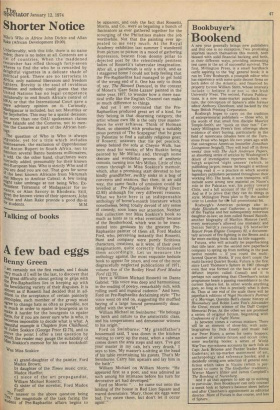Talking of books
A few bad eggs 8enny Green „lam certainly not the first reader, and I doubt mverY much if I will be the last, to discover that great difficulty about getting to grips with ttihle Pre-Raphaelites lies in keeping up with ,e bewildering variety of their disguises. It is TMost as if Rossetti had decided that in adhult.ion to the acceptance of certain painterly 141rloiples, each member of the group must ,„Iree to change hats as often as possible, not Much in order to epater le bourgeois as to ttlilake it harder for the bourgeois to epater ern, for if you are never sure who is who, it 7 comes impossible to decide what is what. A utiful example is Chapters from Childhood, Juliet Soskice (George Prior £2.75), and to trOve the point I offer a test question by the reader may gauge the suitability of Ss Soskice's memoir for his own bookshelf:
Was Miss Soskice a) grand-daughter of the painter, Ford Madox Brown; b) daughter of the Times music critic, Madox Hueffer; c) niece of the art propagandist, William Michael Rossetti; d) sister of the novelist, Ford Madox Ford?
the answer to the above question being the magnitude of the task facing the Kudent of Pre-Raphaelite affairs begins to
be apparent, and only the fact that Rossetti, Morris, and Co., were as beguiling a bunch of fascinators as ever gathered together for the scourging of the Philistines makes the job worthwhile. Not that the painting ever ap pealed to me very much. At the Royal Academy exhibition last summer I wandered from picture to picture in a mood of gathering depression, beaten from doomy pillar to , dejected post by the relentlessly penitent ladies of Rossetti's tubercular imagination. After all, a paintbrush is only a stick, and -as I staggered home I could not help feeling that the Pre-Raphaelites had managed to get hold of the wrong end of it. One has only to think of, say, The Blessed Damozel, in the context of Monet's `Gare Saint-Lazare' painted in the same year, 1877, to wonder how a mere nautical trifle like the English Channel can make so much difference to things.
And yet I am convinced that the PreRaphaelites produced great art of a kind, for they belong in that disarming category, the artist whose own life is the only true masterpiece he ever achieves. Think of Holman Hunt, so obsessed with producing a suitably pious portrait of 'The Scapegoat' that he goes to Palestine to find a suitably religious goat; of Rossetti, unaware that his pet peacock, asleep behind the sofa at Cheyne Walk, has been dead for weeks; of Mrs Ruskin being -painted by Mr Millais and, through some obscure and wonderful process of aesthetic osmosis, turning into Mrs Millais. Little of this comes through. in Miss Soskice's memoir, which, after a promising start devoted to her kindly grandfather, swiftly sinks in a bog of convents and seances. But then, in an odd way, the same faults of omission could be levelled at Pre-Raphaelite Writing (Dent £2.95) although for very different reasons. What we have here is an indispensable anthology of horse's-mouth literature which nonetheless, being totally devoid of any sense of comedy, soon loses our attention. Neither this collection nor Miss Soskice's book so much as hints as to what eventually became of the Brotherhood, which was to be transmuted into geniuses by the greatest PreRaphaelite painter of them all, Ford Madox Ford, who, perceiving instantly that Rossetti, Hunt and company were purely fictitious characters, creations, as it were, of their own imaginations, quite correctly fictionalised them accordingly. Let us measure the anthology against the most exquisite bedside book to appear for years, and one of the most disgracefully neglected publications of 1971, volume five of the Bodley Head Ford Madox Ford (£2.75).
Here is William Michael Rossetti on Dante Gabriel: "His voice was deep and harmonious; in the reading of poetry, remarkably rich, with rolling swell and musical cadence." And here, Ford on Pre-Raphaelite declaiming style: "The voice went on and on, suggesting the muffled baying of a large hound permanently dissatisfied with the world."
William Michael on Swinburne: "He belongs by birth and nature to the aristocratic class, and his temperament and demeanour witness to his origin."
Ford on Swinburne: "My grandfather's housemaid said, 'I was down in the kitchen waiting to carry up the meat, when a cabman comes down the area steps and says, 'I've got your master in my cab, he's very drunk.' I says to him, 'My master's a-sitting at the head of his table entertaining his guests. That's Mr Swinburne. Carry him upstairs and lay him in the bath'."
William Michael on William Morris: "He appeared first as a poet, and was admired as such among his intimates before his turn for decorative art had developed."
Ford on Morris: ". . . he came out onto the landing of the house in Red Lion Square and roared downstairs. `Mary, those six eggs were bad. I've eaten them, but don't let it occur again'."


































 Previous page
Previous page